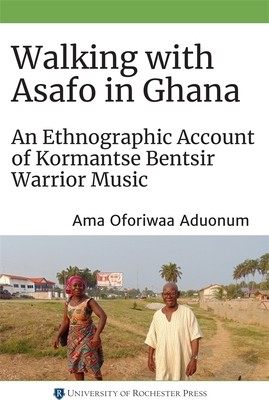
- We will send in 10–14 business days.
- Author: Ama Oforiwaa Aduonum
- Publisher: University of Rochester Press
- ISBN-10: 1648250440
- ISBN-13: 9781648250446
- Format: 15.2 x 22.9 x 2.1 cm, minkšti viršeliai
- Language: English
- SAVE -10% with code: EXTRA
Reviews
Description
The first full-length study of the musical pasts of Asafo warrior associations based on the author's "ways of walking" with local scholars along the Ghanaian littoral.
What is Asafo ndwom (music)? How and when is it performed? What is the state of this warrrior tradition that once served as the bedrock of the Akan, Ewe, and Ga societies in Ghana? How does Asafo enact the past and serve as an archive for the people? In an attempt to answer these questions, Walking with Asafo in Ghana investigates the musical pasts of Asafo. The book is an ethnography of walking, organized into eight chapters. Each chapter ends with a piece of creative writing in the author's "ethnographic voice," in which she sums up the main ideas. It is Aduonum's attempt at an anticolonial and decolonialist African musicology, one that subverts and decenters white racial framing of research, analysis, and presentation, disrupting how Euro-American concepts frame our ways of telling and experiencing ndwom. Aduonum's goal on this trajectory is to tell her story, create something new, and chart a new path. Through this fluid and complex book, she repositions African Elders' knowledge as "epistemologies of decolonization and de-coloniality" and centers the stories shared by local Fante scholars. The text is polyvocal, multimodal, multiperspective, performative, reflexive, and dialogic, informed by the structure of Asafo ndwom, appellations, proverbs, her mentors' tellings, and "embodied" calling and responding. It is a performative scholarly discourse, ndwom-based: a performance. As a celebration of Asafo, those warriors who insisted their lives matter, the text is meant to be read and performed. This book is openly available in digital formats thanks to a generous grant from the Andrew W. Mellon Foundation.EXTRA 10 % discount with code: EXTRA
The promotion ends in 22d.23:54:39
The discount code is valid when purchasing from 10 €. Discounts do not stack.
- Author: Ama Oforiwaa Aduonum
- Publisher: University of Rochester Press
- ISBN-10: 1648250440
- ISBN-13: 9781648250446
- Format: 15.2 x 22.9 x 2.1 cm, minkšti viršeliai
- Language: English English
The first full-length study of the musical pasts of Asafo warrior associations based on the author's "ways of walking" with local scholars along the Ghanaian littoral.
What is Asafo ndwom (music)? How and when is it performed? What is the state of this warrrior tradition that once served as the bedrock of the Akan, Ewe, and Ga societies in Ghana? How does Asafo enact the past and serve as an archive for the people? In an attempt to answer these questions, Walking with Asafo in Ghana investigates the musical pasts of Asafo. The book is an ethnography of walking, organized into eight chapters. Each chapter ends with a piece of creative writing in the author's "ethnographic voice," in which she sums up the main ideas. It is Aduonum's attempt at an anticolonial and decolonialist African musicology, one that subverts and decenters white racial framing of research, analysis, and presentation, disrupting how Euro-American concepts frame our ways of telling and experiencing ndwom. Aduonum's goal on this trajectory is to tell her story, create something new, and chart a new path. Through this fluid and complex book, she repositions African Elders' knowledge as "epistemologies of decolonization and de-coloniality" and centers the stories shared by local Fante scholars. The text is polyvocal, multimodal, multiperspective, performative, reflexive, and dialogic, informed by the structure of Asafo ndwom, appellations, proverbs, her mentors' tellings, and "embodied" calling and responding. It is a performative scholarly discourse, ndwom-based: a performance. As a celebration of Asafo, those warriors who insisted their lives matter, the text is meant to be read and performed. This book is openly available in digital formats thanks to a generous grant from the Andrew W. Mellon Foundation.

Reviews